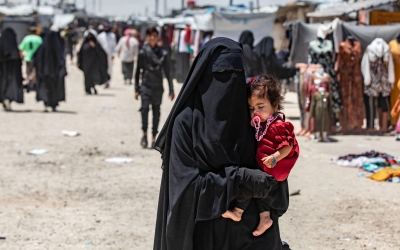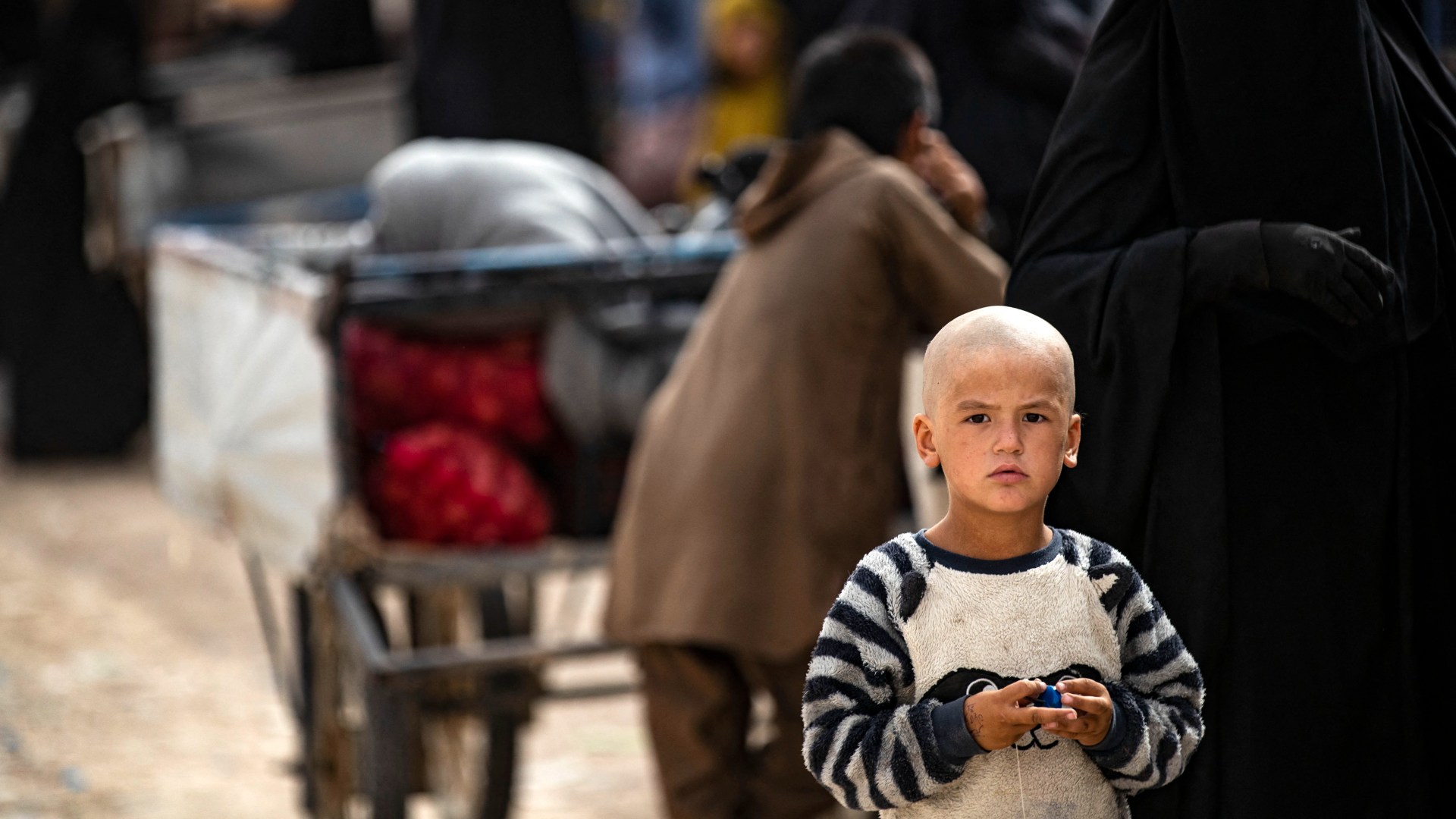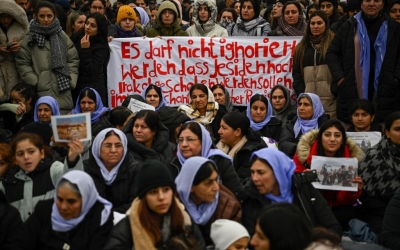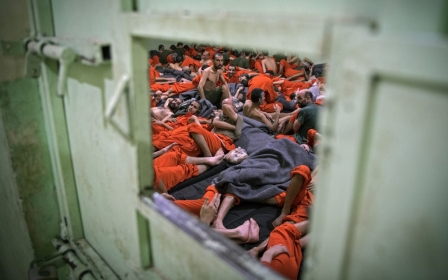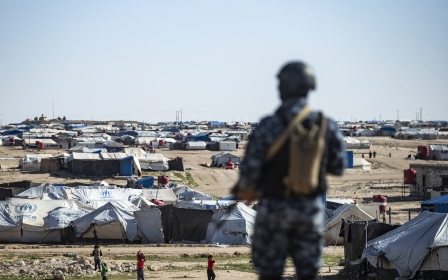Syria: Kurdish forces accused of torture and 'mass death' in prisons
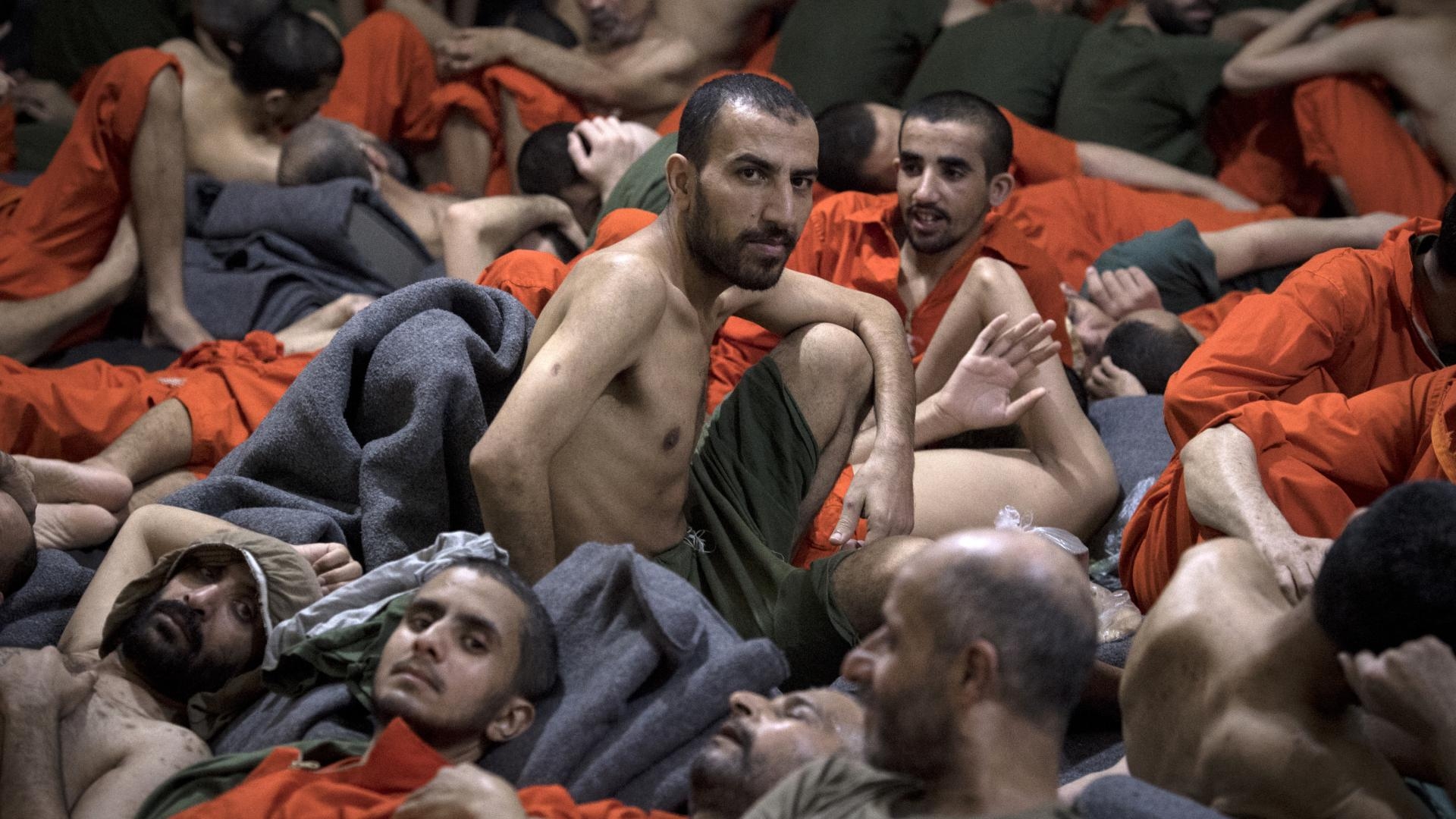
Hundreds of detainees have died as a consequence of torture and inhumane treatment in Kurdish-run prisons in northeast Syria for people suspected of links to the Islamic State group (IS), according to Amnesty International.
In a new report published on Wednesday, the human rights organisation accused authorities and security forces in the Autonomous Administration of North and East Syria (AANES) of committing war crimes at prisons and detention facilities where it said more than 56,000 people - the majority of them children - remain captive.
Launching the report on Wednesday, Nicolette Waldman, a senior crisis adviser at Amnesty, said the US government had played a “key role” in the detention system because of its support for the Kurdish authorities, including funding since 2015 totalling hundreds of millions of dollars.
“The US is involved in most aspects of this detention system. They played a key role in establishing the system in the first place and they’ve played a key role since in supporting and maintaining the system,” said Waldman.
The report found that US officials and military personnel had visited detention facilities and were likely aware of the brutal treatment inflicted on detainees.
New MEE newsletter: Jerusalem Dispatch
Sign up to get the latest insights and analysis on Israel-Palestine, alongside Turkey Unpacked and other MEE newsletters
Local officials told Amnesty that US intelligence bodies were involved in conducting interrogations of American nationals and Syrian and Iraqi detainees, while several other states had interrogated their own nationals.
“These interrogations, from what we were told, are very regular, they’ve been happening over the course of years and we were told that the US has interrogated all what are termed ‘high-value’ suspects as well as all of their nationals,” Waldman told Middle East Eye.
Access for third states
“Something that became clear through this process is just how much access there is for third states through this system of detention,” Waldman added.
US forces had also delivered detainees into Kurdish custody, where they were subsequently tortured, and had repatriated detainees to countries, including Saudi Arabia and Iraq, where they were at risk of further rights abuses, Amnesty said.
Amnesty also said that scores and possibly hundreds of Yazidis captured and enslaved during IS militants’ genocidal campaign against the minority group in Iraq and Syria likely remained among about 14,500 women and 30,000 children being held at the Al-Hol and Al-Roj detention camps.
Most of those held in the camps were rounded up during the final battles between IS militants and the Kurdish-led Syrian Democratic Forces (SDF) near Baghouz in 2019, and many women were victims of trafficking and forced marriages with IS militants, it said.
While the arbitrary detention of women and children at Al-Hol and Al-Roj, and the refusal of some countries to repatriate their own nationals from the camps, have long been condemned by rights groups, Amnesty’s report reveals harrowing details about conditions inside a network of prisons and interrogation facilities where about 11,500 men are still being held.
It highlighted the Sini detention facility, near Al-Shaddadi city in Al-Hasakah governorate, where it said thousands of prisoners had been subjected to “unrelenting and systematic brutality” resulting in at least hundreds of deaths.
“Former detainees said they were subjected to torture or other ill-treatment primarily in the form of beating with various implements, but also including whipping with electrical cables, suspension from the wrists in what is known as the shabeh stress position, sexual violence and electric shocks,” the report said.
In one incident in 2020, a former detainee said that 17 people in his cell had died of suffocation after prison authorities turned off an exhaust fan. Other former detainees said the bodies of those who died were buried in a mass grave inside the prison complex.
Tuberculosis outbreak
Former detainees also described routinely being denied access to adequate food, water and medical care.
One detainee said that he and his cellmates had regularly gone for two or three days without water, leaving them so thirsty that on one occasion one of his cellmates tried to drink urine from the toilet in the cell.
“Former detainees said the combination of the physical abuse, inhumane conditions and lack of medical care led to the deaths of at least many hundreds of people, if not more. Former detainees recounted witnessing friends and other cellmates dying in front of them, sometimes in large numbers,” the report said.
'We know the Americans, they come with their weapons and their dogs… They could see the people who were injured from torture'
– Former detainee in Amnesty report
Amnesty said that about 800 detainees remained in the prison in 2023, down from about 3,000 to 4,000 detainees prior to 2022.
One former detainee told Amnesty that US soldiers had visited the prison in 2021 to collect biometric data and check on the state of the prison.
“We know the Americans, they come with their weapons and their dogs… [They] checked on the prison, and they searched us, and all of our rooms… [We] were going outside to the courtyard. It was the same courtyard where we were tortured. They were able to see the blood on the wall. They could see the people who were injured from torture,” the report quoted the detainee as saying.
At another detention facility in al-Hasakah city, known as Panorama, Amnesty said that a lack of adequate medical care had resulted in an outbreak of tuberculosis that had been ongoing and unchecked for years.
Kurdish officials confirmed to Amnesty that nearly 600 detainees held at Panorama had died as a result of tuberculosis and other diseases, according to the report.
Torture and mistreatment had been systematically used in another 15 detention facilities to coerce confessions, extract intelligence or as a form of punishment, Amnesty said.
Women held in camps and prisons also described incidents of torture and sexual violence. One former detainee said she had been subjected to electric shocks while pregnant.
Waldman said: "Men, women and children told us they were subjected to the same methods of torture. They included electric shocks, stress positions, severe beating. The majority of these people we interviewed were Syrians who were being tortured to confess."
Kurdish authorities and security forces have long faced accusations of torturing and abusing detainees in their custody. In 2017, the parents of Jack Letts, a British-Canadian man still imprisoned in northeast Syria, raised concerns with the British foreign office that Letts could die as a result of alleged mistreatment by his captors.
According to documents seen by MEE, Letts' parents said he had told them he had been "subject to electrocution" and threatened with being "put in a box".
Kurdish officials said the allegations were "baseless", and British officials took no action because there was deemed to be "no public sympathy" for Letts. He was subsequently deprived of his British citizenship. Canada has also refused to repatriate either Letts or other Canadian men held in the prisons.
Sally Lane, Letts' mother, told MEE that her son had also told a consular officer in Ottawa in January 2018 about his torture in detention.
"Since then, the Canadian government has done precisely nothing to address the issue of his mistreatment, and claimed in August 2023 they didn't even know where he was or if he was still alive," she said.
"I am disgusted thst for six years the government has used the defence of incompetence in order to evade responsibility for the terrible suffering that Jack and the other detainees have endured."
According to the report, about 42 percent of detainees (about 23,500 people) are Syrian, 37 percent (20,700) Iraqi, and the remaining 21 percent (11,700) foreign nationals from approximately 74 countries.
Amnesty called on AANES to investigate and address allegations of torture and other abuses, and to end practices which it said had led to “mass death as well as severe pain and suffering”.
It called on the US government and its anti-IS coalition allies to take steps to enforce international humanitarian law. And it called for a United Nations-led international response to address “the detention crisis in northeast Syria”.
Agnes Callamard, Amnesty’s secretary general, said: “The autonomous authorities, the US government, other members of the coalition and the UN must all work together and prioritise the urgent development of a comprehensive strategy to bring this shameful system into compliance with international law and identify justice solutions to finally hold perpetrators of IS’s atrocity crimes to account.
“They should conduct an urgent screening process to identify individuals in detention who should be immediately released, with a particular focus on victims of IS crimes and at-risk groups.
“While this is under way, they must ensure that the violations being committed are stopped immediately, and reports of torture and death are independently investigated.”
30,000 children still detained
Amnesty’s report follows a plea last month by Paulo Pinheiro, the chair of the UN’s International Commission of Inquiry on the Syrian Arab Republic, for action to address the situation of the 30,000 children still detained in the camps.
Kurdish officials did not respond to MEE’s request for comment. But in a response to Amnesty, the AANES said it operated in compliance with international human rights laws.
It said it had “not received any information or complaints” regarding alleged torture, and said that if abuses had occurred they were “individual acts”.
It said allegations about ill treatment and lack of food, water and healthcare in detention facilities were untrue, but admitted there were shortages of medical supplies and conditions of overcrowding in detention facilities.
AANES highlighted the difficult conditions it faced, including continuing conflict and a lack of resources to manage and maintain the prisons and camps. It said members of the international community had failed to “fulfil their legal and moral obligations" by failing to repatriate their own nationals.
The US State Department also called for the repatriation of detained foreign nationals to their countries of origin and said it “remained committed to addressing the dire humanitarian and security challenges” in the region.
It said: “We take seriously and remain deeply concerned about reports of human rights abuses including extrajudicial killings; torture and cruel, inhuman or degrading treatment or punishment; arbitrary detention; and enforced disappearance.
“We continuously urge all actors in Syria, including the Syrian Democratic Forces (SDF), to uphold human rights, protect civilians, and to respond appropriately to allegations of abuse and civilian harm, including by holding perpetrators accountable as appropriate.”
Middle East Eye delivers independent and unrivalled coverage and analysis of the Middle East, North Africa and beyond. To learn more about republishing this content and the associated fees, please fill out this form. More about MEE can be found here.


